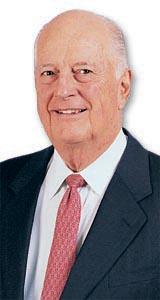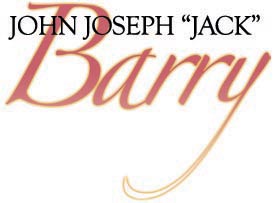
The Brotherhood
and organized labor lost a friend and leader when former IBEW President John
Joseph “Jack” Barry passed away on
August 28, 2005,
of pulmonary
fibrosis.
October 2005 IBEW
Journal
Brother Barry was elected to the office of International President in August 1986 upon the retirement of President Charles H. Pillard, 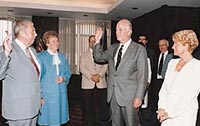 serving in that position until his own retirement on January 29, 2001. serving in that position until his own retirement on January 29, 2001.
Taking the oath of office
as International President in 1986 from then-IP Charles Pillard
(left) as Mrs. Barry (right) looks on.
An electrician’s son and a former business manager of IBEW Local 43 in Syracuse, New York, President Emeritus Barry steered the Brotherhood with a steady hand through a tumultuous period that saw the deregulation of the electric utility industry, rapid technological change in all branches and economic and political realignment that changed the nature of work in North America.
 Working with the tools in the
1950s. Working with the tools in the
1950s.
International
President Edwin D. Hill paid tribute to President Emeritus Barry,
saying, “Jack Barry was our friend, brother and a leader
who left indelible marks on the course of trade unionism. He showed
all of us the way to a brighter future for working people through
his insistence from day one that union organizing and increased
skill training were the road to the future. We walked a long way
with Jack, and we’re
all the better for it.”
Brother Barry’s successful efforts to expand organizing,
especially in the construction branch, started with aggressive
internal education. The Construction Organizing Membership Education
Training (COMET) and the Membership Education and Mobilization
for Organizing (MEMO) programs were developed under his leadership.
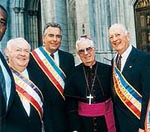 Thousands of IBEW members have attended classes to enhance their
organizing skills. Thousands of IBEW members have attended classes to enhance their
organizing skills.
A proud moment as Grand Marshal
of the 1998 New York City Labor Day Parade with (from left) AFL-CIO
President John Sweeney, New York City Central Labor Council President
and Local 3 member Brian McLaughlin and Bishop Patrick Sheridan.
His commitment to education and training is reflected in the
fact that the apprenticeship and training center in his home Local
43 is named in his honor, as is a scholarship program for the School
for Industrial Relations at the Jesuit-run LeMoyne College in Syracuse.
Barry rarely missed an opportunity to use the stature of his office to influence legislation affecting workers’ rights or the opening of foreign markets to goods produced by IBEW members. Both of those goals were furthered when President Bill Clinton appointed him to the Competitiveness Council and the President’s Export Council.
 At
an IBEW-sponsored campaign rally for Sen. At
an IBEW-sponsored campaign rally for Sen.
Hillary Clinton with
then-President Bill Clinton.
In
an IBEW Journal message at the time of his retirement, Barry addressed
the frustrations and hopes facing those who advocate on behalf
of workers. “Political and economic tides ebb and flow,” he wrote, “bringing good and bad times. But there is nothing we cannot accomplish if we truly dedicate ourselves to our goals and principles. Your future is in your hands and no one else’s.”
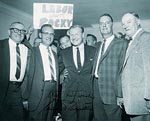 Left,
as Local 43 busines manager (2nd from right) with New York Gov.
Nelson Rockefeller. Left,
as Local 43 busines manager (2nd from right) with New York Gov.
Nelson Rockefeller.
As new technologies swept through IBEW trades and workplaces,
Barry emphasized the union’s
traditional strengths in training and skills development. The
IBEW undertook major initiatives in upgrading technical education
and training for members in all branches.
Vince O’Reilly, who served as senior executive assistant to President Emeritus Barry, recalls Brother Barry’s hard work and early office hours, saying, “Nothing stayed on Jack’s desk too long.”
President Emeritus Barry built the IBEW’s reputation through his participation as Vice President and Executive Council Member of the AFL-CIO and Executive Council Member of the Building and Construction Trades Department and the Metal Trades Department. He was often sought out for his counsel on key issues confronting the labor movement.
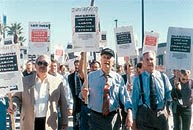 Leading
a march for justice for Las Leading
a march for justice for Las
Vegas building trades workers with
then-
IST Ed Hill (right) and Eighth
District IVP Jon Walters
(left).
AFL-CIO President John Sweeney said, “President Barry presided
over significant growth in his union despite aggressive anti-union
campaigns by employers, anti-union government policies and massive
economic change. For more than 50 years, Barry served with tireless
dedication, distinguished leadership and unparalleled devotion.”
His commitment to charitable work flowed from his belief that the IBEW was the “Union of Hearts and Minds.” Brother Barry was selected as Man of the Year by the Cardinal’s Committee on the Laity for the Archdiocese of New York in 1984. He received the “God and Country” Award from the St. George Association’s Chapter 80 in Long Island, New York, and the “Brotherhood/Sisterhood Labor Award” from the National Conference of Christians and Jews, along with numerous other honors.
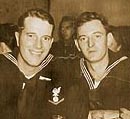 President
Barry (left) in the President
Barry (left) in the
Navy during World War II.
Born in Syracuse, New York, on
May 19, 1924, Brother Barry was initiated into Local 43 in Syracuse in January 1943. He served in the U.S. Navy from 1943-46.
While working for contractors in central New York, Pennsylvania and Maryland, Brother Barry became active in Local 43, serving on the executive board. It was while working in building construction that he contracted a form of asbestosis which contributed to his death.
He was elected business manager in 1962. In 1968, he was appointed International Representative and in 1976 became International Vice President of the Third District covering New York, New Jersey, Pennsylvania and Delaware.
 President
Barry in 1991 President
Barry in 1991
In
August 1986, Brother Barry was elected International President
by the International Executive Council, the 15 th member to serve
in that office. He was unanimously elected to a full term by
the delegates to the 33 rd International Convention in September
1986 in Toronto, Ontario. He won reelection unanimously at the
IBEW’s
Centennial Convention in St. Louis in 1991 and again by an overwhelming
margin at the 35 th Convention in Philadelphia in 1996.
Brother
Barry is survived his wife, Kitty, of Chevy Chase, Maryland,
and four children: retired Navy Capt. John M. Barry, Marie Murphy,
Eileen Russell and Vincent Barry; a brother; 10 grandchildren
and three great-grandchildren.
Sincere sympathy is extended to Brother Barry’s wife, family
and friends by all of the officers and members of the Brotherhood.

|

